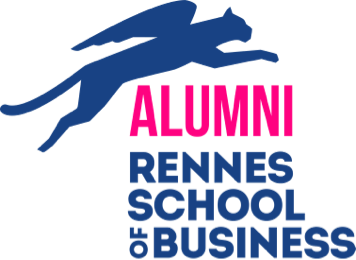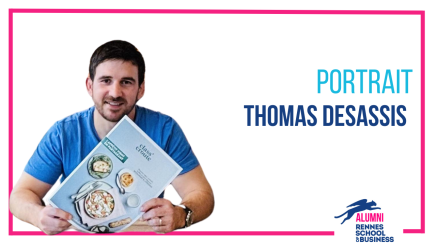News

[Interview with] Philipe ROUCOULE
Philippe ROUCOULE, Senior Vice President - Consumer Products EMEA, Warner Bros. Discovery
Philippe Roucoule, a 1993 graduate of Rennes School of Business, has built a remarkable career in the consumer goods and entertainment industries. From food and beverages to Warner Bros. Discovery, via Disney, his journey reflects both his adaptability and his strategic approach to change. Today, as Senior Vice President - Consumer Products EMEA, he oversees the development of merchandise inspired by some of the world’s most iconic film and pop culture franchises. In this interview, he looks back on his career path, his values, and shares valuable advice for today’s graduates.
What memories do you have of Rennes School of Business?
The school gave me an open-mindedness I could never have imagined. I learned there one of the most important attitudes for the rest of my life: to constantly explore in order to find the place and the job that suit you best. I had the opportunity to spend a gap year in Wales and loved the experience so much that I went back there as soon as I could after graduating. Thanks to the mindset I developed at Rennes, I’ve always dared to change fields without fear, and that has guided me throughout my career.
Before joining the entertainment industry, you started your career in the food sector. What did you take away from that experience?
Food was my first choice. It’s a dynamic and demanding sector where you learn very quickly. I decided to start my career in Category Management, an approach that helps distribution channels optimize their sales strategy and allowed me to gain strong experience in marketing, sales, and data analysis.
My time in retail with The Co-operative Group and later Burton’s Biscuits, now part of the Ferrero Group, was an excellent learning experience. The sector is, as we say here, cut-throat — there’s no room for error. I learned real working methods there, particularly how to collaborate effectively with large retailers. I was able to move between companies without overspecializing, which always allowed me to seize new opportunities depending on where the most interesting prospects lay.
How did your transition to the entertainment industry come about?
I had a stable and well-defined career path in the food industry until one of my contacts offered me an incredible opportunity at Disney. My first reaction was surprise:
— The park?
— No, the home video division.
Disney had anticipated the growth of this market and was looking for profiles with experience in category management and retail. I took my chance.
It was a fascinating experience: the world of entertainment, video games, Hollywood… it was like stepping into a giant toy store. I didn’t know the industry, but my skills in retail and category management were perfectly transferable. I quickly understood that even in entertainment, product management depends on rigorous planning and a deep understanding of customer expectations.
I stayed there for seven years, then, sensing that Netflix and Amazon were about to shake everything up, I decided to move within Disney and join the consumer products division — an area where the company is a global leader.
Everything went perfectly for two more years… until a major restructuring. I hadn’t anticipated that at all. When you love your job and everything is going well, you don’t always see layoffs coming. But when a company downsizes, your individual value doesn’t change the outcome — you’re not in control.
That’s when I truly realized the importance of maintaining a diverse professional network. Fortunately, I had always nurtured mine, and after a short freelance experience, one of my contacts connected me with Warner Bros., where the ideal role was waiting for me.
Today, I am Senior Vice President – Consumer Products EMEA at Warner Bros. Discovery.
You oversee the development of licensed products for Warner Bros.’ biggest franchises. What are the specific aspects of your job?
My role is primarily to ensure a perfect alignment between Warner’s brand image and its product extensions. At Warner, we don’t manufacture products ourselves. We collaborate with licensees such as Mattel, LEGO, or Celio, who design, produce, and sell the products, paying royalties back to Warner.
I make sure these partners create products that are consistent with our brand universes and with consumer expectations — whether it’s a luxury watch or a pair of socks. It’s a cross-functional role, at the intersection of marketing, sales, legal, finance, product development, and creativity.
My mission is also to anticipate product offerings to ensure they match consumer demand. When a film is released, a complete product line must already be ready to immerse the audience in our worlds. For us, 2025 is already locked, we’re finalizing 2026, and beginning to plan for 2027.
What does a typical day look like for you?
I wake up every morning at 6 a.m. I take 30 minutes of quiet time before heading to the office — by bike (21 km) or public transport. That’s my only routine, because the rest of the day is anything but predictable! Even with a structured schedule, surprises always arise: a partner in difficulty, a project to adjust… My role is to find solutions quickly without panicking, relying on our internal network to activate the right levers.
My days are punctuated by key moments: EMEA meetings in the afternoon, then calls with the Los Angeles headquarters in the evening. I lead a team of around 160 people, but our projects often involve three times that number. Anticipating the commercial impact of a licensed product remains one of the biggest — and riskiest — challenges.
A recent example: the launch of the Superman product lines. The challenge was real: the last film was released in 2013, the target audience had changed, and superhero films had been met with lukewarm reception over the previous five years. We liked the film when we saw it in preview, but its commercial success remained uncertain. We focused on launching merchandise at the beginning of the year based on the classic Superman of the mid-20th century to rekindle fan interest, and followed up with movie-related products in June. The gamble paid off, thanks in particular to global collaborations with Spinmaster, Zara, and SHEIN, which worked very well.
Of course, not all launches are as successful. Some films struggle at the box office, which makes selling related products more complex. TV series offer slightly more predictability but can also surprise us. An unexpected hit can suddenly require a rapid scale-up: can we produce and distribute fast enough? Do we have the right inventory?
In this business, everything depends on two pillars: a strong network and great adaptability.
How do you anticipate the success or failure of film releases?
With production costs that can reach hundreds of millions of dollars, Hollywood studios have had to rethink their strategy. The era of risky bets is over: franchises have become the norm. They ensure a constant flow of licensed products, extending well beyond theatrical releases.
Today, around 80% of licensed products are planned years in advance. The remaining 20% allow for the introduction of new characters, surprise effects, and renewed excitement. This balance helps maintain audience interest while minimizing commercial risk for our partners.
What values guide your management style?
Trust and authenticity are at the heart of everything. In a world where we handle sensitive information, confidentiality is non-negotiable. I need to work in a healthy environment where words can be trusted and values are shared.
Kindness is just as essential. A workplace can quickly become toxic if human relationships are neglected. We spend most of our days at work — a caring manager makes all the difference. That doesn’t mean avoiding tough topics, but handling them with respect while preserving relationships. I’ve learned to separate the personal from the professional, which has allowed me to navigate complex situations while maintaining excellent relationships with colleagues and partners.
Finally, humility is key. You can’t know everything — and it’s precisely the ability to learn, seek, and listen that drives growth.
You’ve successfully navigated major turning points in your career. What advice would you give to cultivate that kind of agility?
I’ve never had a 10-year career plan. What has always guided me is curiosity — both in my professional and personal life. I’ve chosen environments where I felt good, letting opportunities and encounters lead the way. This mindset has allowed me to explore different roles, anticipate shifts — like the fall of home video — and evolve with agility in constantly changing industries.
My approach combines rigorous analysis and intuition. For me, a solid decision is 80% logic, 20% instinct. That balance helps me stay reactive without losing sight of my values.
If I had to give one piece of advice, it would be this: stay curious, sincere, and human. That’s what builds a strong network. The number of contacts doesn’t matter — it’s the quality that counts. LinkedIn is a powerful tool, as long as you stay active and relevant, but nothing replaces real, face-to-face interactions. It’s those often informal meetings that have opened new doors for me throughout my journey.
Finally, a word about the UK?
Music is what first drew me to British culture. In the 1990s, the scene was incredible. I came here for that, lived in Manchester, then in London for the past 25 years, and I can honestly say I’ve never been disappointed. I still discover new artists every week — like last night, at The Bug Club concert. Although I don’t yet have British citizenship, I feel completely at home here.
Since Brexit, it’s become harder for foreigners to get work permits, but the job market remains dynamic, and the Anglo-Saxon culture promotes professional mobility much more freely than in France. People change sectors or companies easily, often every two years. Degrees matter at the beginning, but soon after, it’s soft skills that make the difference. I’d say that 99% of the time, cultural fit is what truly counts.
Looking back, I think this mindset of curiosity is exactly what resonated here — and what has allowed me to thrive fully within this culture.
 1
1















No comment
Log in to post comment. Log in.